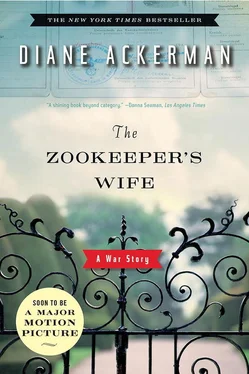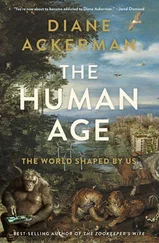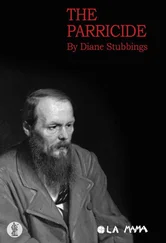The older boys believed, as Antonina did, that war belonged to the world of adults, not children. She sensed that Ryś yearned to grill them with questions, though he didn’t want to look stupid or, worse, like a little kid, so he kept quiet about the invisible hand grenade lying at his feet that everyone feared might explode.
“What a subject to be broached by the innocent lips of children,” Antonina reflected, glancing at the sun-bronzed faces of the three boys, glistening in the light cast by a large oil lamp. “Grazed by sadness” about their safety, she wondered yet again: “What will become of them, if war begins?” It was a question she’d been denying, sidestepping, and rewording for months. “Our animal republic,” she finally admitted to herself, “exists in the busiest and most buzzing Polish city, as a small autonomous state defended by the capital. Living behind its gates, as if on an island cut off from the rest of the world, it seems impossible the waves of evil spilling across Europe could overwhelm our little island as well.” As darkness began seeping into everything, erasing edges, a free-floating anxiety plagued her; eager as she was to mend the fabric of her son’s life the instant holes formed, she could only await the unraveling.
She meant the last idylls of summer to be well spent, so the next morning she organized a mushroom-hunting brigade, with prizes and honors for whoever bagged the most saffron milk-cap, boletus, and button mushrooms, which she planned to jar. If war did erupt, spreading mushroom marinade on bread in winter would fill everyone with cottage memories of river swims, Badger’s antics, and better days. They hiked four miles to the Bug River, with Ryś carried piggyback at times, Zośka trotting alongside, and Badger riding in a knapsack. Stopping by meadows along the way, they picnicked and played soccer, with Badger and Zośka serving as goalies, though Badger battled fiercely over the leather ball once he latched onto it with teeth and claws.
Most summer weekends, Antonina left Ryś with his nanny in the country and returned to Warsaw to spend a few days alone with Jan. On Thursday, August 24, 1939, the same day Britain renewed its pledge to aid Poland if Germany invaded, Antonina made her usual visit to Warsaw, where, to her shock, she saw antiaircraft sites ringing the city, civilians digging trenches and erecting barricades, and, most disturbing of all, posters that announced an imminent draft. Only the day before, foreign ministers Ribbentrop and Molotov had stunned the world by revealing that Germany and the Soviet Union had signed a nonaggression pact.
“The only thing dividing Berlin from Moscow is Poland,” she thought.
Neither she nor Jan knew of the pact’s secret clauses, already hacking up Poland after a two-stage invasion and divvying up its desirable farmlands.
“Diplomats are cagey. This might only be a bluff,” she thought.
Jan knew Poland hadn’t the planes, weapons, or war equipment to compete with Germany, and so they started talking seriously about sending Ryś somewhere safer, to a town of no military interest, if such a place existed.
Antonina felt as though she were “waking from a long dream, or entering a nightmare,” either way a psychic earthquake. Vacationing far from the political clatter of Warsaw, cocooned in “the calm, level order of the farmer’s life, the harmony of white sand dunes and weeping willows,” with each day enlivened by eccentric animals and a little boy’s adventures, it had been nearly possible to ignore world events, or at least stay optimistic about them, even stubbornly naïve.
WARSAW, SEPTEMBER 1, 1939
JUST BEFORE DAWN, ANTONINA WOKE TO THE DISTANT SOUND of gravel pouring down a metal chute, which her brain soon deciphered as airplane engines. Let them be Polish planes on maneuver, she prayed as she went onto the terrace and scouted a strange sunless sky, veiled as she’d never seen it before, not with clouds but a thick golden-white gloss hanging low on the ground like a curtain, yet not smoke, not fog, and stretching along the horizon from rim to rim. A veteran of World War I and a reserve officer, Jan had spent the night on duty, but she didn’t know where, just “somewhere outside the zoo,” in the city canyons beyond the mental moat of the Vistula.
She heard “the hum of planes, tens, maybe even hundreds,” that sounded like “faraway surf, not a calm surf but when waves crash onto the beach during a storm.” Listening a moment longer, she detected the telltale unsynchronized hum of German bombers that Londoners, later in the war, swore they heard grumbling, Where are you? Where are you? Where are you?
Jan returned home by 8 A.M., agitated and with only sketchy information. “Those won’t be the practice maneuvers we were told about,” he said. “They’ll be bombers, Luftwaffe squadrons escorting the approaching German army. We’ve got to leave right away.” With Ryś and his nanny safe in Rejentówka, they decided to head first to the nearer village of Zalesie, where his cousins lived, but waited for further updates on the radio.
This was the first day of the school year for Polish children, a day when the sidewalks should have been streaming with school uniforms and knapsacks. From the terrace, they saw Polish soldiers sprinting in all directions—down the streets, over lawns, even into the zoo—erecting balloon barriers, aligning antiaircraft guns, and piling long black cannon shells tapered at one end like animal droppings.
The zoo animals seemed unaware of danger. Small fires didn’t scare them—for years they’d trusted the sight of household bonfires—but they grew alarmed by the sudden flood of soldiers, because the only humans they’d ever seen in early morning were the dozen or so blue-uniformed keepers, usually with food. The lynxes began gargling a sound between roar and meow, the leopards chug-chugged low notes, the chimpanzees yipped, the bears brayed like donkeys, and the jaguar sounded as though it were hacking up something lodged in its throat.
By 9 A.M., they’d learned that, to justify invasion, Hitler had staged a phony attack on the German border town of Gleiwitz, where SS troops dressed in Polish uniforms commandeered a local radio station and broadcast a fake call to arms against Germany. Although foreign journalists imported to witness the events were shown dead bodies of prisoners (dressed in Polish uniforms) as proof of hostilities, no one fell for the charade. Still, even such a hoax couldn’t go unanswered, and at 4 A.M. Germany’s battleship Schleswig-Holstein bombarded an ammunition depot near Gdańsk, and Russia’s Red Army started preparing to invade from the east.
Antonina and Jan packed hurriedly and set out on foot across the bridge, hoping to make their way to Zalesie, beyond the Vistula River and only a dozen miles to the southeast. As they approached Zbawiciel Square, the engine noise ground louder and then planes floated overhead, appearing in the gap between the rooftops like stereopticon slides. Bombs whistled down and struck a few streets in front of them, with black smoke followed by the crackling of shattered stucco roof tiles and the rasp of brick and mortar crumbling.
Every bomb creates a different scent, depending on where it hits, what it boils into aerosol and the nose detects slipping apart, as molecules mix with air and float free. Then the nose can pick up ten thousand distinctive scents, from cucumber to violin resin. When a bakery was hit, the rising dirt cloud smelled of yeast sours, eggs, molasses, and rye. The mingled odors of cloves, vinegar, and burning flesh spelled the butcher’s. Charred flesh and pine meant an incendiary bomb that blasted houses with a hot, fast fire, and that the people inside had died quickly.
Читать дальше












